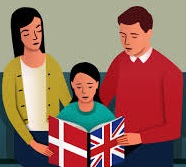《圖書與藝術》版塊
Johnson
約翰遜專欄
Keeping it in the family
家族傳承
For expat parents, passing on their native languages can be a struggle
外籍父母想要下一代傳承母語并非易事
“You understand grandmother when she talks to you, don’t you, darling?” The girl nods. Johnson met her—and her Danish mother and English father—at the airport, en route to Denmark. The parents were eager to discuss their experience of bringing up their daughter bilingually in London. It isn’t easy: the husband does not speak Danish, so the child hears the language only from her mother, who has come to accept that she will reply in English.
“奶奶和你說話的時候你能聽懂嗎,親愛的?”小女孩點了點頭。約翰遜在去丹麥的機場見到了小女孩,以及小女孩丹麥籍的母親和英國籍的父親。這對父母很想分享在倫敦用雙語撫養女兒的經歷。這并非易事:丈夫不會講丹麥語,小女孩只能從母親那兒聽到丹麥語,母親已經接受了女兒只會用英文回復她的事實。
This can be painful. Not sharing your first language with loved ones is hard. Not passing it on to your own child can be especially tough. Many expat and immigrant parents feel a sense of failure; they wring their hands and share stories on parenting forums and social media, hoping to find the secret to nurturing bilingual children successfully.
這個過程很痛苦。不能與所愛之人分享母語是艱難的。不能將母語教給孩子尤為艱難。許多外籍和移民的父母都感到挫敗感;他們焦頭爛額地在育兒論壇和社交媒體上分享故事,希望找到成功培養雙語兒童的秘訣。
Children are linguistic sponges, but this doesn’t mean that cursory exposure is enough. They must hear a language quite a bit to understand it—and use it often to be able to speak it comfortably. This is mental work, and a child who doesn’t have a motive to speak a language— either a need or a strong desire— will often avoid it. Children’s brains are already busy enough.
兒童的語言可塑性較強,但這并不意味著粗略地接觸就足夠。必須聽的足夠多直到能夠理解,用得足夠多直到能夠順暢地表達出來。這是一種腦力勞動,而一個沒有需求或強烈愿望作為動力的孩子將會經常避免這種腦力勞動。孩子們的大腦已經夠忙碌了。

So languages often wither and die when parents move abroad. Consider America. The foreign-born share of the population is 13.7%, and has never been lower than 4.7% (in 1970). And yet foreign- language speakers don’t accumulate: today just 25% of the population speaks another language. That’s because, typically, the first generation born in America is bilingual, and the second is monolingual—in English, the children often struggling to speak easily with their immigrant grandparents.
因此,父母移居國外時,母語會越說越少。以美國為例。父母至少有一方是外國人的人口比例為13.7%,從未低于4.7%(1970年)。然而講外語的人并沒有增多:如今只有25%的人口能講外語。這是因為,一般情況下這樣的第一代能講雙語,到了第二代就只能講一種語言,因而孩子們和移民祖父母(或外祖父母)交流總是有障礙。
In the past, governments discouraged immigrant families from keeping their languages. Teddy Roosevelt worried that America would become a“polyglot boarding- house”. These days, officials tend to be less interventionist; some even see a valuable resource in immigrants’ language abilities. Yet many factors conspire to ensure that children still lose their parents’ languages, or never learn them.
過去,政府不鼓勵移民家庭保留其母語。泰迪·羅斯福擔心美國將成為一個“通曉多種語言的寄宿家庭”。 如今,政府傾向于減少干預;有些官員甚至在移民的語言能力中發現了寶貴的資源。但在各種因素同時作用下,孩子們仍然不能完全通曉父母的母語,抑或永遠都學不會。
譯文由可可原創,僅供學習交流使用,未經許可請勿轉載。












